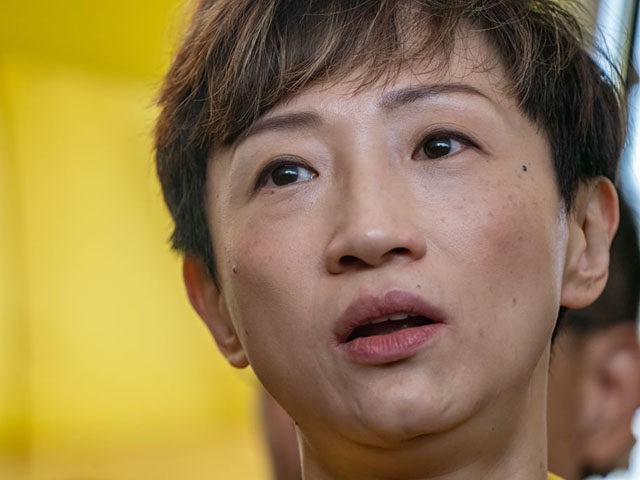Pro-democracy Hong Kong legislator Tanya Chan told the U.N. Human Rights Council (UNHRC) in Geneva on Monday that an investigation of police brutality in Hong Kong is urgently needed. She spoke after a weekend of violent clashes between protesters and police that included some demonstrators throwing bricks at the local Chinese military base.
Chan’s address to the UNHRC was opposed by the mainland Chinese government, which called her a “convicted criminal” in a letter that urged the U.N. to deny her accreditation.
Chan, founder of the Civic Party in Hong Kong, was convicted of causing a public nuisance during the 2014 “Umbrella Movement” protests in Hong Kong, until now the high-water mark of resistance to Beijing’s authority, and was given a suspended sentence. Her sentencing was delayed until June 2019 because she required radiotherapy treatment for a benign brain tumor, and her sentence was suspended on the same grounds, along with the court’s judgment that she had “good personal character.”
“Today marks the 100th day of the movement, but there is no sign the police will exercise restraint. This is a direct result of the lack of democracy in Hong Kong, as the government is not held accountable for its endorsement of police abuse,” Chan told the UNHRC on Monday.
Chan accused Hong Kong police of attacking “innocent subway passengers whom they claimed were rioters in disguise,” firing thousands of tear gas canisters, and using “brutal crackdowns and preemptive violence” as “pest control” against protesters they regard as “cockroaches.”
“Will the High Commissioner support our appeal for this Council to convene an urgent session and establish a Commission of Inquiry, to ensure justice and human rights for the people of Hong Kong?” she asked.
“Why is China sitting here, as a member of this Human Rights Council?” Chan pressed.
Last weekend’s protests were a mixture of massive peaceful demonstrations and more confrontational actions, most of the latter occurring after dark, as described by Voice of America News:
Some of the thousands of protesters threw bricks at police outside the Chinese People’s Liberation Army base and tore down and set fire to a banner proclaiming the 70th anniversary of the October 1 founding of the People’s Republic of China.
Police said in a statement, “Radical protesters are currently occupying Harcourt Road in Admiralty, vandalizing Central Government Offices and repeatedly throwing petrol bombs inside.”
Some of the protesters engaged in cat-and-mouse skirmishes with police, setting street fires and blocking roads in the heart of the city. Authorities quickly doused the fires and fired tear gas to disperse the protesters. The bursts of blue-dyed water from the water cannons were used so authorities could later identify law-breakers.
“We are really worried about the situation, because there is obviously an escalation of police brutality. I am afraid that loss of life may happen if the escalation of brutality by police continues,” Chan said when asked about the weekend’s events during an Agence France-Presse (AFP) interview.
Chan pessimistically predicted China will not send in military forces to crush the Hong Kong protest movement because the police “are actually doing their job for them.”
Last week the U.N. Human Rights Commission heard from two Hong Kong businesswomen, Pansy Ho Chiu-king and Anni Wu Suk-ching, who defended the government’s response to the protest movement and accused the protesters of causing all the violence.
“The views of a small group of radical protesters do not represent the views of all 7.5 million Hong Kongers. The systematic and calculated violent acts of this group have never been condoned by all Hong Kongers,” Ho and Wu said.
Ho accused the protest movement of “hijacking” the “well-intended” extradition bill that spurred the massive demonstrations, claiming they misrepresented the bill and used it as “propaganda to undermine the Hong Kong government’s authority to protect the rights of one of its citizens even in her death.”
This was a reference to a woman murdered in Taiwan whose accused killer fled to Hong Kong and could not be extradited to face justice. Critics of the bill feared it would become easier for China to drag both residents and foreign visitors to Hong Kong into the Communist mainland’s highly politicized legal system.
China’s official envoy to Geneva said last week that Beijing would not tolerate “undesirable or uninvited rhetoric” from foreign bodies about what it regards as an internal security matter and said the UNHRC is not the “right venue” to discuss the protests.

COMMENTS
Please let us know if you're having issues with commenting.